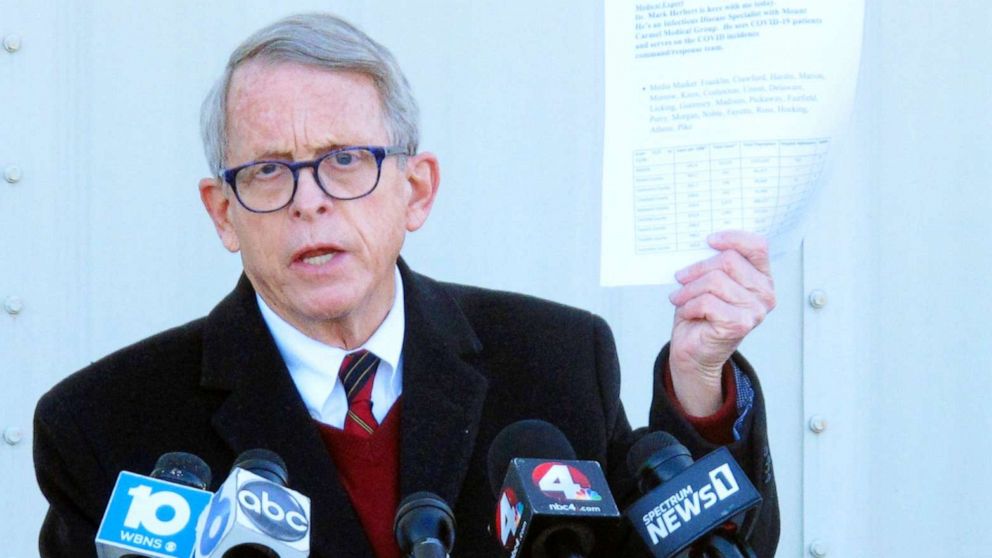We can't give up wearing masks as COVID cases fall: Ohio governor
Despite an increase in the number of people who have received COVID-19 vaccines, Americans should not stop wearing masks, Ohio Gov. Mike DeWine said on ABC's "This Week" Sunday.
"With the vaccine, we're now on the offense, that's the great thing. But in Ohio, we can't give up the defense. We have found that these masks work exceedingly well. Schools are a prime example. We've seen it in retail ... we know that this makes a huge, huge difference," the Republican governor told "This Week" Co-anchor Martha Raddatz.
He said by the close of business Monday there will probably be over 2 million Ohioans who will have received their first vaccine dose and a million who have gotten the second dose.
"Every day gets better and better and better," he added.
Several GOP governors this past week began lifting mask mandates and further opening up businesses amid declining coronavirus infection rates, despite guidance from the Centers of Disease Control and Prevention and the Biden administration.
Raddatz asked DeWine if he thought Texas Gov. Greg Abbott had made a political decision when he lifted the mask mandate and reopened businesses.
"I don't know what's going on in Texas," he said. "I got one state to worry about, that's Ohio. And that's -- that's a full-time job."
Raddatz followed up, pressing the governor, "You have also faced pressure to end the mask mandate. You're a conservative. Your constituents know the risks now. What's wrong with the argument that people will make up their own minds?"
"Throughout (the pandemic), we've really learned a lot. You know, when this started a year ago, no one had a clue how effective these masks were," DeWine responded.
DeWine reversed an order requiring masks in businesses and retail stores a day after implementing the mandate in April.
"It became very clear to me after we put out the order that everyone in retail who walked into a store as a customer would have to do that, it became clear to me that that was just a bridge too far that people were not going to accept the government telling them what to do," he said on "This Week" May 5. "And so we put out dozens and dozens of orders, that was one that it just went too far"
DeWine instituted a statewide mask mandate in Ohio on July 23, after weeks of issuing county-level mask mandates for areas deemed to be in the “red” zone.
"When we put the mask order on and actually started enforcing it ... we saw a significant drop in cases, a slow down. So we've seen it throughout this last year, these masks really, really work," he said Sunday.
The governor has not outlined a date for when the state's mask mandate would be lifted, instead announcing Thursday that all Ohio health orders would end once the state gets down to 50 cases per 100,000 residents for two weeks.
As of Wednesday, the statewide average for COVID-19 infections was about 180 cases per 100,000 residents for the last two weeks -- less than half the average from early February.
To illustrate the effectiveness of mask wearing, DeWine also highlighted studies conducted in schools.
"Even when kids are closer than 6 feet apart in schools, when they're all wearing a mask -- virtually no spread in that school and that classroom," he said.
The governor's comments were reiterated by Brown University School of Public Health Dean Dr. Ashish Jha -- who appeared later on "This Week" and told Raddatz, "We have figured out how to make schools safe. And I think we have lots of evidence that with mask wearing and -- and reasonable ventilations, schools can be very safe places."
However, despite research demonstrating the safety of reopening schools in conjunction with mask wearing, the Cleveland Teachers Union voted this past week to continue remote learning, even though Ohio prioritized vaccinating educators who pledged to return to the classroom by March 1 and all teachers and personnel in this school district who wanted to be vaccinated have been.
"(Teachers) were given priority over others because of their jobs and yet still do not want to go back to the classroom. What are you doing to resolve that?" Raddatz asked.
"I think it's going to get worked out," DeWine said. "I like to look at the glass as 95% full because, you know, if you go back at the beginning of this year, half of our kids in Ohio were totally remote. Today, 95% of them are in class."
"We made a deal," he said explaining that if the schools would go back by March 1, "we will vaccinate everyone in your school that wants to. And it's worked exceedingly well."
"They need to go back," he added.
Jha agreed that most teachers should return to work.
"I've also advocated for teachers' vaccination as an added layer of protection. And I believe most teachers are going to be perfectly willing to go back. It's safe for them. It's safe for the kids. There may always be some outliers. But we have to deal with that," he said.
ABC News' Quinn Scanlan contributed to this report.




